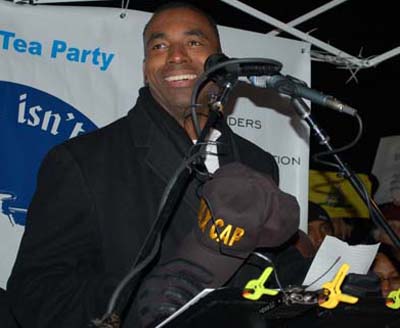Maryland Tea Partiers Defeated, But Not Deflated
Captial News Service
Friday, Sept. 17, 2010
WASHINGTON - Sarah Palin-backed Brian Murphy may have lost Maryland's Republican gubernatorial primary, but the tea partiers who supported him can't be counted out of the general election yet.
Murphy held most of the Maryland tea party movement's hopes, and the most valuable asset of all: an endorsement from former vice presidential candidate Palin, whose backing was credited with Delaware Republican Christine O'Donnell's stunning win over Rep. Mike Castle in the Senate primary.
The state's tea party potential is still alive in Congressional District 5 for GOP nominee Charles Lollar, who will face House Majority Leader Steny Hoyer, D-Mechanicsville, in November.
Lollar easily won the nomination with 58.1 percent of the vote, according to the unofficial tally.
But the wave of populist enthusiasm fell short for Murphy, even with almost 260,000 last-minute robo-calls from Palin on his behalf, according to a Murphy press release. He was defeated by former Gov. Bob Ehrlich, who will take on Gov. Martin O'Malley in a rematch of the 2006 election.
But Murphy's supporters won't automatically transfer to Ehrlich: After Murphy endorsed Ehrlich and the two appeared together at a Sept. 15 rally, Ehrlich went on a WBAL radio show and, when asked to embrace Murphy as a "rising star," said "quite frankly we have a lot of rising stars in our party, including people who have won races."
Ehrlich's dismissive treatment of Murphy may come back to bite him, said Sam Hale, a Silver Spring tea party leader and former Murphy campaign coordinator.
Hale, who said his Maryland Society of Tea Party Patriots has 1,300 members, wrote in an e-mail that Ehrlich "significantly hurt chances of a majority of the Murphy camps supporting him, going forward...
"Unless (state GOP Chairwoman) Audrey Scott and Bob Ehrlich begin to show a significant amount of respect for Brian Murphy. ... I believe that they will have little chance of convincing Maryland conservatives to support the GOP ticket in November."
Ehrlich spokesman Andy Barth said reaction to the radio statement was not an "accurate interpretation."
"The governor has great respect for the enthusiasm and commitment that Murphy brought to this race," Barth said. "What we need to win (Murphy supporters') votes is to be the best option to achieve their goals, and our goals are very similar....We want fiscal responsibility, we want lower taxes and we want jobs."
Yet, even former Ehrlich campaign worker Dave Schwartz, now heading one of Maryland's larger tea party groups, the state Americans for Prosperity chapter, acknowledged some "slight rumblings" and "Internet Facebook chatter" about Ehrlich's treatment of Murphy. They're still firmly in the Ehrlich camp, he said.
Despite the loss, Murphy's campaign helped unify an otherwise disjointed conservative movement, commentator Richard Falknor of BlueRidgeForum.com said. While he didn't earn the nomination, Murphy convinced one in four Republican voters that he was the better candidate.
"They've been out there," Falknor said. "They came together in the Murphy campaign they got to know each other, and that's Murphy's legacy."
That legacy might not be one that helps Ehrlich in November, Hale said in an interview.
"We could either give him the boost he needs or be an active force against him," he said. "It's going to be tough for Ehrlich to win back support."
This fragmentation is likely to harm the Republicans, at least this year, said Frances Lee, a professor of American government at the University of Maryland, College Park.
"There's so much turmoil within the party," Lee said, adding that Democrats are "sure to benefit from this fight."
Frank McCabe, chairman of the Solomons-based Calvert County Republican Central Committee, agreed, saying Ehrlich "really needs to recognize that he needs to reach out to these groups." But McCabe also said that when push comes to shove in November, most conservatives will end up voting for Ehrlich.
University of Maryland, Baltimore County political science professor Laura Hussey agreed, saying that while tea partiers might hesitate to knock on doors or distribute materials for him, "in the end people are going to step in line and vote for Ehrlich."
But unlike Murphy, tea party-backed candidates across the U.S. still have another election to get through, and many are questioning their ability to unseat longtime Democratic politicians.
"I don't think anybody would disagree that that intraparty Republican anger has changed the complexion of a number of races at a state and a district level," White House Press Secretary Robert Gibbs said at a Sept. 15 press briefing. "What remains to be seen is whether or not these are candidates that are going to win."
Lollar is among those candidates. He has been active at tea party events since the "9/12 Tea Party" in the District last year. Though Democrats may not hold onto the House majority after the election, Hoyer's prominent role in Democratic leadership makes him one of the most prized targets for conservatives, tea party or not.
Lollar said he has the momentum against a "vulnerable" Hoyer.
"The tea party is waking people up across party lines," Lollar said. "Regardless of party affiliation, we're willing to sacrifice political experience as long as we're sacrificing for those who possess hard-core constitutional values."
And, though many are saying Lollar has the strongest chance for a District 5 Republican in years, experts are skeptical about his chances -- Hoyer has held his seat since 1981 and garnered more than 65 percent of the vote in all but three of his 14 general elections.
Hoyer just has too much going for him in the district for Lollar to overcome, even with the energy of his tea party brethren, Hussey said.
"I think he's going to make Steny Hoyer fight harder for that seat than he has in the past few elections," Hussey said. "But in the end, I don't think it's a competitive seat at all. ... Hoyer can say, 'Hey I brought home the goods for the district,' and he has."
Regardless of the structure of the movement, the tea party groups' role as a significant political presence can't be ignored even if they don't make a significant dent in the 2010 races, Hussey said.
"To the extent that they have any effect at all, it's going to be a long-term effect," Hussey said. "They're going to force some changes in the Republican Party. ...The historical record shows that when third-party movements gain some steam, one of the major parties accommodates them."
The tea party movement's own lack of central leadership also could be a detriment moving toward the general election.
Tea parties don't work like a regular political party, operating without a centralized organization or leadership, said Brad Botwin, director of Help Save Maryland, a Rockville-based conservative group focusing on illegal immigration and one of 32 Maryland "tea party groups" listed on Teapartypatriots.com.
"You know, I don't know what a tea party is," Botwin said. "I just think it's lots of people who are getting involved."
And, Hale said, "That's the beauty of it."




